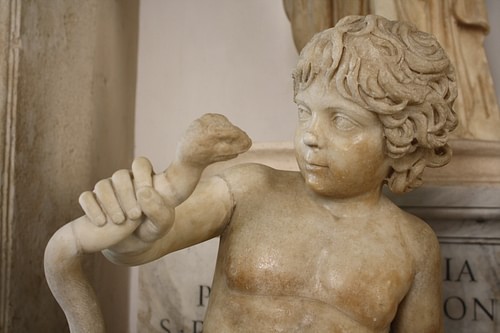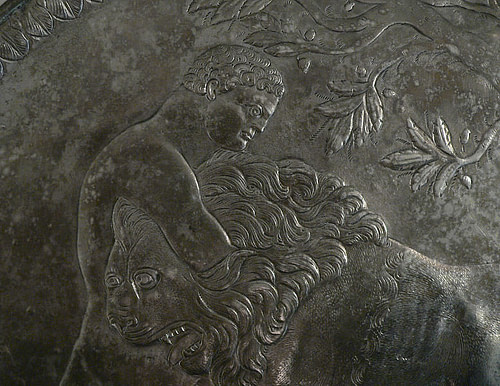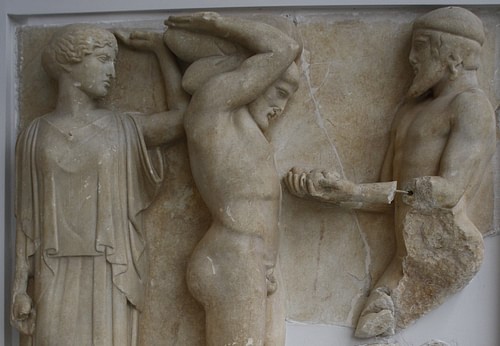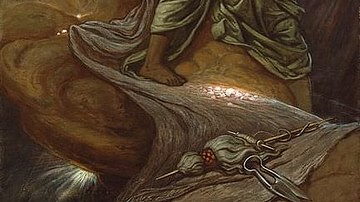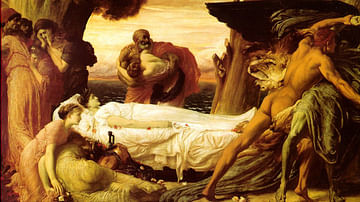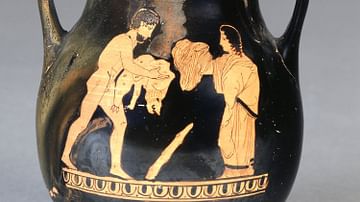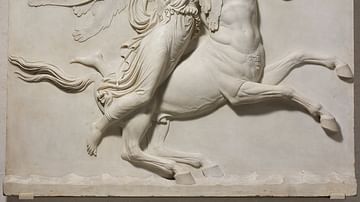Hercules is the Roman name for the Greek hero Herakles, the most popular figure from ancient Greek mythology. Hercules was the son of Zeus, king of the gods, and the mortal woman Alcmene. Zeus, who was always chasing one woman or another, took on the form of Alcmene's husband, Amphitryon, and visited Alcmene one night in her bed, and so Hercules was born a demi-god with incredible strength and stamina. He performed amazing feats, including wrestling death and traveling twice to the underworld, and his stories were told throughout Greece and later in Rome, yet his life was far from easy from the moment of his birth, and his relationships with others were often disastrous. This was because Hera, the wife of Zeus, knew that Hercules was her husband's illegitimate son and sought to destroy him. In fact, he was born with the name Alcaeus and later took the name Herakles, meaning "Glory of Hera", signifying that he would become famous through his difficulties with the goddess.
The demi-god, who suffered like mortals and who could make a mess of things in life just as easily as any man or woman but perform deeds no mortal could, had great appeal for the people of Greece and Rome. Hercules was a kind of super-powered everyman who suffered disappointments, had bad days - even bad years - and eventually died due to another's trickery. These stories, besides simply being entertaining, would have served an ancient audience by letting them know that, if bad things could happen to a hero like Hercules, they had nothing to complain about regarding the disappointments and tragedies in their own lives. Hercules served as a symbol of the human condition where, to use Hemingway's phrase, "a man may be destroyed, but not defeated." An interesting aspect of Hercules' character is that, because of his divine strength and abilities, he did not have to willingly submit to any of the labors or punishments imposed upon him. He chose to suffer indignities such as his famous Twelve Labors or his servitude to the queen Omphale and did so willingly. His inner strength and ability to endure hardships made him an inspirational figure to the people and a symbol of stability in the midst of chaos, even if it was a chaos he himself had caused. The historian Thomas R. Martin writes:
The only hero to whom cults were established internationally, all over the Greek world, was the strongman Herakles (Hercules). His superhuman feats in overcoming monsters and generally doing the impossible gave him an appeal as a protector in many city-states (129).
Early Life
Although he was seen as the champion of the weak and a great protector, Hercules' personal problems started literally at birth. Hera sent two witches to prevent the birth, but they were tricked by one of Alcmene's servants and sent to another room. Hera then sent serpents to kill him in his cradle, but Hercules strangled them both. In one version of the myth, Alcmene abandoned her baby in the woods in order to protect him from Hera's wrath, but he was found by the goddess Athena who brought him to Hera, claiming he was an orphan child left in the woods who needed nourishment. Hera suckled Hercules at her own breast until the infant bit her nipple, at which point she pushed him away, spilling her milk across the night sky and so forming the Milky Way. She then gave the infant back to Athena and told her to take care of the baby herself. In feeding the child from her own breast, the goddess inadvertently imbued him with further strength and power.
He was brought up at the court of his supposed-father Amphitryon, where he had the best tutors in the land who taught him wrestling, horseback riding, fencing, archery, how to drive a chariot, play the lyre, and sing. Hercules did not know his own strength, however, and killed his music teacher, Linus, by hitting him with a lyre one day during an argument. He was then sent to tend the flocks to keep him out of trouble. This seems to have been an impossibility for Hercules, however, as he heard that the Theban army had been defeated by a band of Minyans and, feeling this was unjust, he led a band of Theban warriors to defeat the Minyans and restore order to Thebes. King Creon of Thebes gave Hercules his daughter, Megara, in marriage as a sign of his gratitude.
The Madness of Hera & the Twelve Labors
At this point in the story, Hercules was a young, successful hero, married and, in time, with three strong sons. Hera could not tolerate the situation and so sent upon him a madness in which he killed his children (and, in some versions, Megara as well). He continued in his rage until Athena knocked him out with a stone and, when he came to, he was overwhelmed with grief at what he had done. He would have killed himself but his cousin Theseus convinced him that would be cowardly and that he must find a way to atone for his sins. Hercules consulted the Oracle at Delphi who told him he must attach himself to his cousin Eurystheus, King of Tiryns and Mycenae, who would devise labors to expiate his sins. These labors originally numbered only ten but later grew to twelve. After Delphi he was no longer known as Alcaeus and took the name Herakles.
The Twelve Labors of Hercules were:
1. To kill the Nemean Lion who was impervious to all weapons. He trapped the lion in a cave and strangled it with his bare hands. He then skinned it and ever after wore the skin as his cloak.
2. To kill the monster known as the Hydra who had nine venemous heads and, when one was cut off, two more would grow in its place. With his nephew Iolaus, Hercules cut off the heads and Iolaus then seared the necks with a torch to prevent them growing back. Hercules then dipped his arrows in the Hydra's blood for future use; since it was so venomous, it killed quickly. Because he had help in this labor, Eurystheus would not count it as one of the ten and assigned another.
3. To capture the Cerynitian Hind who was sacred to the goddess Artemis. Hercules spent over a year trying to catch the deer with the golden antlers alive and finally brought it down with an arrow to the hoof. Even so, Artemis refused to allow him to take the deer - and would have killed him for hunting it - until she heard the story of his labors and let him go.
4. To capture the Erymanthian Boar. This labor took Hercules to the land of the Centaurs, and the wine he had been given to attract the boar drew the centaurs to him. They attacked him and he had to kill many of them but brought the boar back alive to Eurystheus. It was during this labor that he took part in the adventure with the hero Jason and his Argonauts.
5. Cleaning the Stables of Augeius in a day. Eurystheus felt this side-adventure with the Argonauts was an unnecessary luxury on Hercules' part and so devised an impossible task for his next labor. The stables of King Augeius were immense and his herd vast, and there seemed to be no way for anyone to clean them in a month, let alone a day. Hercules said he would do it but made Augeius promise him a tenth of the herd if he succeeded. Augeius agreed since he knew he could not lose, but Hercules diverted two rivers to flow through the stables and clean them completely. Augeius then refused to honor the deal he had made. Hercules felt cheated and swore he would return and kill Augeius once he had completed his labors for Eurystheus. Eurystheus, however, told him he could receive no payment for his labors and that, by trying to profit, he had disqualified that labor and would have to do another to make up for it.
6. To drive away the Stymphalian Birds who were ravaging the countryside. He accomplished this with a rattle given to him by Athena. The rattle startled the birds who flew away, and Hercules shot them down with his arrows in flight.
7. To bring back the Cretan Bull from Knossos. The bull belonged to King Minos of Crete and was sacred to the god of the seas, Poseidon; accordingly, it could walk on water. Minos no longer wanted the bull because his wife had fallen in love with it and, in fact, had become pregnant by it (giving birth to the Minotaur), and so Minos happily gave the bull to Hercules who rode it across the sea from Crete to Athens and brought it to Eurystheus. The bull was then released and would cause further trouble throughout Attica until it was finally killed by Theseus.
8. To bring back the Mares of Diomedes. Diomedes was a Thracian king who fed his horses on a steady diet of human flesh so that no one could come near them. Hercules fed Diomedes to the horses and, when they were full, brought them back to Eurystheus. It was during this labor, either going to or coming from Diomedes' palace, that Hercules stopped to visit his old friend Admetus whose wife Alcestis had recently died. Hercules wrestled death for the soul of Alcestis and returned her to her husband.
9. To bring back Hippolyte's Girdle. Hippolyte was the queen of the Amazons, and her belt (girdle) was a symbol of her right to rule. The Amazons originally welcomed Hercules but Hera, disguised as one of them, spread a rumor that Hercules had come to kidnap the queen and enslave them. The women attacked Hercules and Hippolyte was killed in the fight; Hercules then took her belt and left. In another version of this labor, however, no one dies; Hercules kidnaps Hippolyte's sister and ransoms her for the belt and then leaves peacefully. On his return voyage he has many other side-adventures, which further enrage Eurystheus, but he accepts the girdle as a legitimate labor.
10. To bring back the cattle of Geryon, king of Cadiz. Hercules had many side-adventures on this labor, including inadvertently building the Pillars of Hercules at Gibraltar and threatening to shoot the sun with his arrows for making him too hot. When he finally reached Cadiz (Spain), he had many problems rounding up the cattle, including having to chase down a bull (the herd had to be complete in order to be accepted for the labor). Bringing the cattle back to Greece, Hera sent gadflies to sting the beasts and scattered them, so Hercules had to round them up again. Then the princess Celtine saw Hercules and fell in love with him. She hid the cattle and would not divulge their whereabouts unless he had sex with her. This he did and so became the father of Celtus, progenitor of the Celts. He finally brought the cattle back to Eurystheus who accepted the labor as legitimate.
11. To bring back the Golden Apples of Hesperides. En route to the sacred grove where the apples grew, Hercules found Prometheus bound to his rock and set him free. Prometheus was grateful and told him that the apples were guarded by a dragon named Ladon who could not be conquered, and so Hercules should try to get the titan Atlas, who held up the earth and heavens on his shoulders, to get the apples for him. When Hercules reached the grove, Atlas agreed to help, but Hercules would have to shoulder the weight of the world while Atlas went to get the apples. Hercules accepted the load and Atlas got the apples. When he returned, however, Atlas did not want to take the weight back and was going to leave Hercules in his place. Hercules cheerfully agreed to stay and hold up the universe but asked Atlas if he could take the weight again for just one moment so that he could adjust his cloak to cushion his shoulders. Atlas took back the universe and Hercules picked up the apples and left.
12. To bring back Cerberus, the guard dog of the underworld. For the last labor, Eurystheus decided on something he knew would be impossible: to bring back, alive, the three-headed dog who guarded the entrance to Hades. Before he could enter the underworld, Hercules had to become initiated in the Eleusinian Mysteries at the sacred city of Eleusis. He then journeyed to Hades, where he had further adventures in the underworld such as freeing his cousin Theseus from the Chair of Forgetfulness where he had been bound. He also spoke with the hero Meleager, with whom he had journeyed with the Argonauts, who told him that, when he returned to earth, he should marry Meleager's sister Deianira. Hercules was allowed by Hades to take Cerberus provided he did not hurt the dog. He wrestled Cerberus into submission and brought him back to Eurystheus who was so terrified of the animal that he told Hercules all the labors were done and to bring the dog back to where he'd found it.
Further Adventures & Slavery
Hercules was now free to do as he pleased with his life and, after all he had accomplished, it might be thought that he would now be able to enjoy his days in peace; this would not be so. Whether through the trickeries of Hera or his own temper and lack of restraint, Hercules would endure further troubles. Struck again by Hera with madness, Hercules killed the prince Iphitus of Oechalia and was told by the oracle that he must sell himself as a slave to atone for his sin. He became the property of Queen Omphale of Lydia who made the hero dress in women's clothing and do needlework with the other ladies of the court. Omphale eventually took him as her lover and then set him free.
He then went on an expedition to Troy which, with the help of other heroes, he conquered (long before the Trojan War) and then became involved in a war with the Titans of Sicily. The Titans had been defeated centuries before by Zeus but had risen again and, according to prophecy, the gods could only win this time with the help of a mortal hero. Hercules helped to defeat the Titans and rescued the world from chaos and the gods from imprisonment. He then sailed back to Greece to get revenge on Augeius for refusing to honor his agreement when he cleaned out the stables. Hercules was defeated in this battle because he was still weakened from the war with the Titans. He left Augeius' land and, after further adventures, landed in Calydon where he met and fell in love with the princess Deianira, the sister of Meleager. He had to wrestle the river-god Achelous for her hand and won, and so was married.
Deianira & Marriage
Deianira and Hercules lived happily for a time in Calydon until he accidentally killed his father-in-law's cupbearer. Although it was an accident, and he was forgiven by the king, Hercules could not forgive himself and so decided to leave the city with Deianira. They reached the river Evenus, and there met the centaur Nessus who offered to carry Deianira across on his back. Upon reaching the other side, however, he tried to rape her and Hercules shot him with one of his arrows. These were the same arrows Hercules had dipped in the blood of the Hydra, and the centaur was dying quickly when he told Deianira that his blood possessed a special quality as a love potion and that she should take some of it in a vial. If ever she felt that Hercules was losing interest in her, he said, she should sprinkle the blood on his shirt and he would be in love with her forever. Nessus understood, of course, that the blood would be deadly to any mortal and this was his revenge for Hercules' arrow.
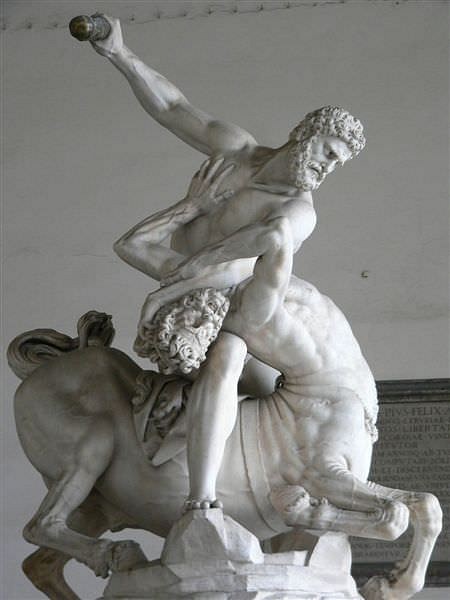
Hercules and Deianira settled in the city of Trachis, started a family, and, again, were happy for a time until Hercules went to war against Eurytus who, like Augeius, had insulted him earlier in life. He killed Eurytus and took his daughter Iole (whom he had won before in an archery contest but been refused) as his concubine. Another version of the myth relates how he helped Artemis kill a boar which was ravaging the kingdom and was given Iole as a gift. Hercules then prepared a victory feast and sent word to Deianira to send him his best shirt to wear at the festival. Deianira, fearing that Hercules was fonder of Iole now than of her, soaked the shirt in the blood of Nessus and then washed away the stains, leaving only the poison. As soon as Hercules put the shirt on, he was seized with agony and began to burn. He tore the shirt from his body but the poison was already grafted to his skin. Since he was a demi-god, he could not die quickly and so suffered as the poison penetrated his body and he became weaker and weaker. Deianira, realizing she had been tricked by Nessus and had killed her husband, hanged herself.
The Death of Hercules
Hercules climbed Mount Etna where he built his own funeral pyre in a clearing, gave away his possessions, and then lay down with his head resting on his club and the Nemean lion's skin covering him; then the torches were lit and the pyre took flames. Thomas Bullfinch, the famous mythologist, writes:
The gods themselves felt troubled at seeing the champion of the earth so brought to his end. But Zeus, with cheerful countenance, thus addressed them: "I am pleased to see your concern, my princes, and am gratified to perceive that I am the ruler of a loyal people, and that my son enjoys your favour. For although your interest in him arises from his noble deeds, yet it is not the less gratifying to me. But now I say to you, Fear not. He who conquered all else is not to be conquered by those flames which you see blazing on Mount Etna. Only his mother's share in him can perish; what he derived from me is immortal. I shall take him, dead to earth, to the heavenly shores, and I require of you all to receive him kindly. If any of you feel grieved at his attaining this honour, yet no one can deny that he has deserved it." The gods all gave their assent; Hera only heard the closing words with some displeasure that she should be so particularly pointed at, yet not enough to make her regret the determination of her husband. So when the flames had consumed the mother's share of Hercules, the diviner part, instead of being injured thereby, seemed to start forth with new vigour, to assume a more lofty port and a more awful dignity. Zeus enveloped him in a cloud, and took him up in a four-horse chariot to dwell among the stars (143).
Legacy
And so Hercules left the earth to live eternally among the gods and, through the stories of his adventures, to enjoy immortality down through the ages. His life was not always a happy one, even though he had a god for a father, and his daily struggles and relationships were not made any easier by his strength. Even though he was able to accomplish great deeds, this did not make him immune to those disappointments and dark times that are a part of the human experience. The historian Sir R.W. Livingstone writes, "The Greeks were fascinated by the spectacle of man and the world, and their fascination is seen not only in their formal philosophy. Of their poets too it may be said that they were born to see the world and human life - not to moralize or indulge in sentiment or rhetoric or mysticism about it, but to see it" (270).
The myths of Hercules show the world as it is: everyone has monsters they need to conquer and seemingly impossible tasks they are faced with and tragedies that seem too hard to bear. As it was in ancient Greece when people would sit and listen to the tales of the hero, so it has been ever since and, even in the modern day, comic books, graphic novels, books, television shows, and Hollywood films featuring Hercules continue to be popular. He remains a hero anyone can relate to, precisely because his life was so far from perfect and his character was less than ideal. When faced with some difficult situation in life, one can take comfort in the thought that, if Hercules could endure his sufferings, one can survive one's own.

